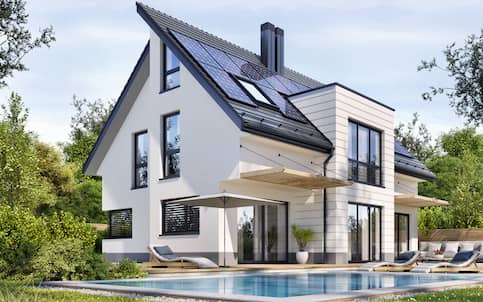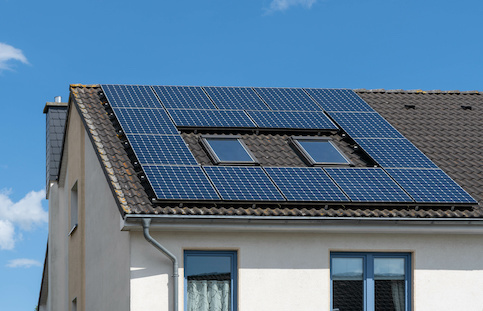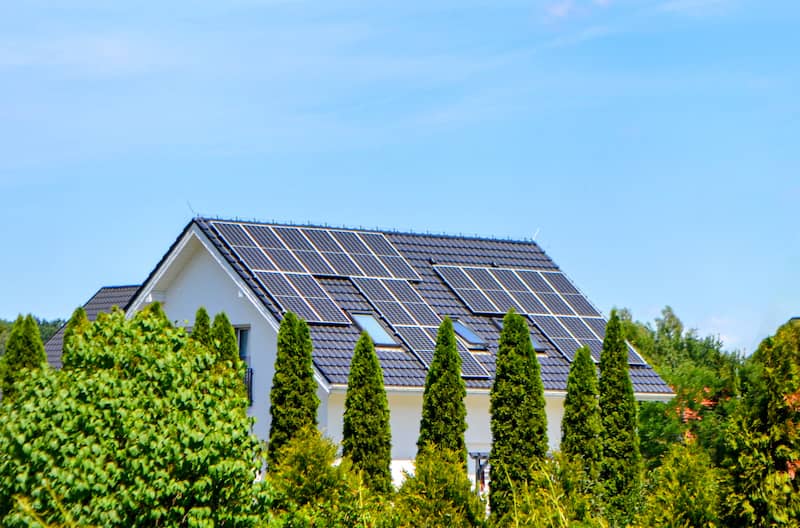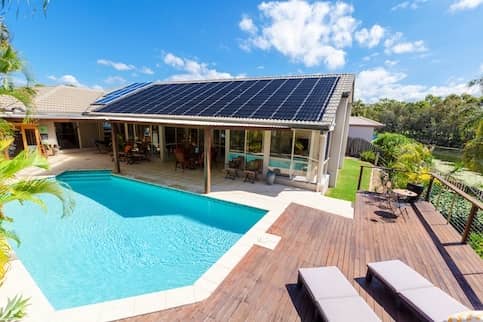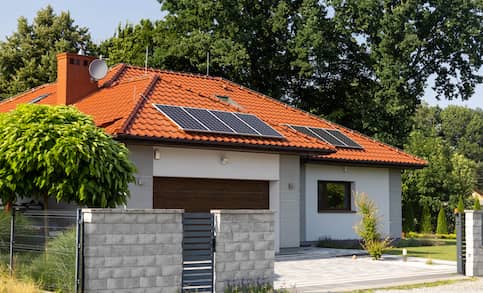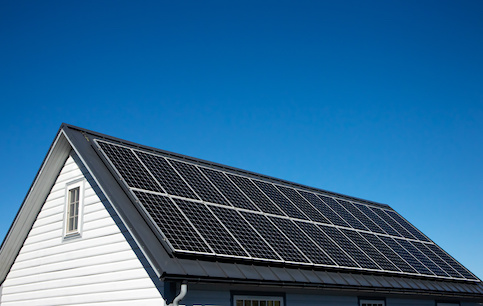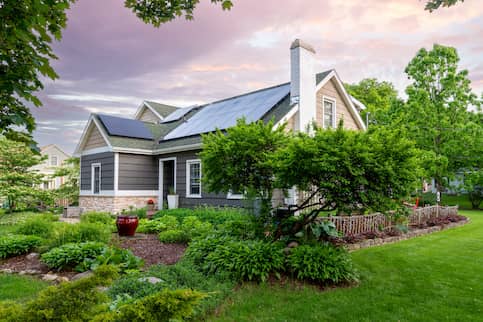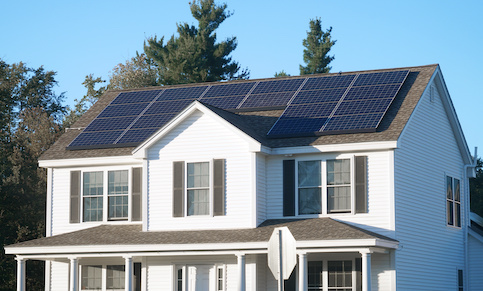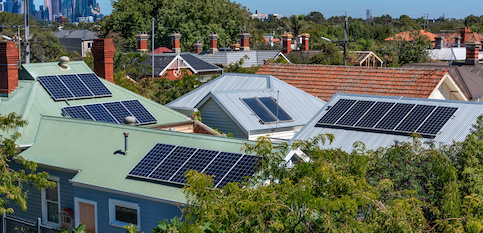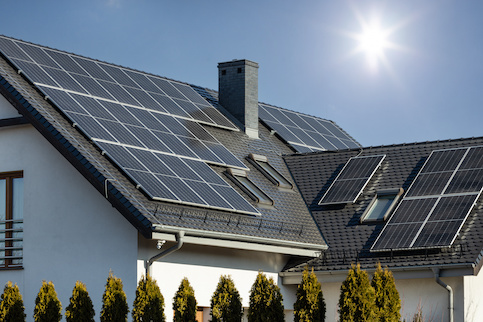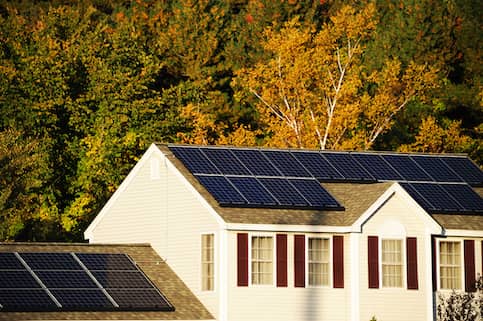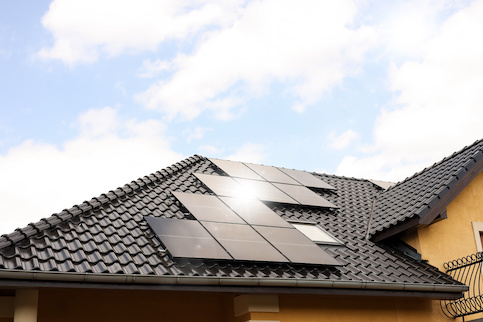Technology is available to harness a free energy source: the sun. For most homeowners, installing solar panels is worth the money if they live in an area with consistent sunlight. There’s an upfront cost, but solar panels can last more than 25 years, offering significant long-term savings on monthly electricity bills. Here are the details on the costs and benefits of solar panels and how to tell if installing a solar panel system on your roof is a good move.
When Is Solar Worth It For Homeowners?
Determining whether solar panels are worth it means assessing your home’s physical attributes and the financial side of the equation. Remember, solar energy relies on panel placement to create enough energy for your home. So, if going solar aligns with your long-term financial goals, here are the factors to consider.
Sun Exposure
The location and direction of a home’s roof to the sun determines the energy each panel generates. Because most of the sun’s energy hits the equator, facing that direction from wherever you are on the globe means absorbing more sunlight. As a result, homes in the northern hemisphere should have panels facing south. If your home’s roof doesn’t face south, you’ll miss the most powerful rays that panels rely on to create electricity.
Likewise, the trees surrounding your home could obstruct sunlight that would otherwise hit your roof. This factor could mean trimming or cutting down trees on your property to ensure optimal sun exposure for your roof. However, if the trees are on a neighbor’s property, doing so might not be an easy option.
Type Of Roof
The size and shape of your roof will come into play for solar energy production. Roofs ideal for solar panels usually have a pitch of 15 – 40 degrees facing south. Flat roofs are also excellent because they streamline installation and allow customized angling.
On the other hand, roofs with steeper slopes incur extra installation costs. Additionally, roofs that receive less sunlight often require high-efficiency panels or more panels installed. These factors increase the cost of going solar.
Home Energy Usage
Next, your home energy usage affects whether solar is worthwhile. To understand how solar could benefit you, it’s crucial to compare your current energy costs to potential solar panel costs. You can do so by reviewing your monthly energy bills or contacting your utility company to see how much you pay per watt. Once you have this information, you can weigh it against the cost of a solar panel system that eliminates or reduces your electric bill.
According to the Lawrence Berkeley National Laboratory, the median national price for stand-alone solar panel systems was $4.20 per watt in 2022. This is a ballpark figure, so the best way to compare is to get a quote from a solar company to understand the cost-effectiveness of switching.
Tax Incentives And Rebates
Homeowners who install solar panels between 2022 and 2032 can receive the Residential Clean Energy Credit from the federal government. This credit is 30% of your solar installation costs. The credit lowers to 26% in 2033 and 22% in 2034, so installing by 2032 lets you reap the highest tax benefit.
For example, if installing solar panels costs $20,000, you can reduce your federal tax bill by 30% ($6,000) when you file. This credit lowers your taxes owed, but can’t provide a refund, meaning the government won’t send you a check if the credit is higher than taxes owed. However, if you can’t use the entire credit in one tax year, you can carry the remainder over to lower your taxes in subsequent years.
Additionally, many states and local governments are offering grants and tax breaks of their own. For example, New York and South Carolina provide a tax break of 25% of installation costs, while New Mexico lowers your taxes by $6.50 per square foot of installation. So, it’s crucial to scope out the rebates and programs for your area to reduce the cost of a solar panel system.
See What You Qualify For
Buy A Home
Discover mortgage options that fit your unique financial needs.

Refinance
Refinance your mortgage to have more money for what matters.
Tap Into Equity
Use your home’s equity and unlock cash to achieve your goals.
What Are The Upfront Costs Of Solar Panels For Homes?
Once you understand how much sunlight your roof can absorb, home energy needs, and financial incentives, the next concern is affording panel installation. Paying for a solar panel system usually costs over $10,000, so planning and budgeting for this expense is likely necessary. From the cost of panels to system customizations, going solar can come with a high price tag.
Installation Costs And Size Of System
Solar panels have hefty upfront costs due to materials, labor, and installation. The Center for Sustainable Energy estimates the average residential solar panel system costs $10,000 to $15,000 before tax breaks and other incentives.
However, this figure can change depending on your home’s size and sunlight exposure. For example, if you have a 2,500-square-foot home, the number of solar panels needed can double compared to a 1,500-square-foot home. Additionally, adding a battery backup can add thousands to the upfront cost.
Pros And Cons Of Solar Panels For A House
Every choice has advantages and disadvantages. Here’s a breakdown of what getting solar panels entails.
Pros
Here’s a closer look at the benefits of solar energy:
- Savings on monthly energy bills: A sky-high electric bill can wreak havoc on your budget. On the other hand, a solar panel system can offset the bulk of your energy costs.
- Reduce reliance on utility companies: When energy costs rise, consumers have little choice but to pay more. Plus, power outages can strike for various reasons, such as weather or a blown transformer. Solar panels reduce your vulnerability to the swings in energy prices and faults in the power grid (if you have a system with a battery to store power).
- Invest in renewable energy: Switching to solar also means helping the planet by reducing the demand for electricity from fossil-fueled power plants. You’ll generate the energy you need while going green.
- Net metering: If your solar panels produce more energy than you need, you could start net metering – selling excess energy to your local grid. This earns you extra money and allows other consumers to use green energy.
Cons
These are the disadvantages to consider before making the investment:
- High upfront costs: Installing solar panels can cost more than $35,000. Even if you pay the average cost of $10,000 to $15,000, this is still a sizable chunk of change to put up. Federal tax credits will defray up to 30% of this cost, but that still leaves you with an expense of several thousand dollars or more.
- Extended payback period: You can finance your solar panels through various loan types with payback periods of 2 to 25 years. Remember, the longer your loan lasts, the more interest you pay, increasing costs.
- Accessibility and affordability vary by location: Your ability to install solar panels depends on the companies and providers in your area. Solar energy systems are still new in some regions, limiting accessibility and increasing costs.
- Potential property tax increase: Solar panels can increase your property value, which in turn causes your local government to assess a property tax increase. Only 31 states offer exemptions for solar-related property tax increases, so it’s crucial to check your state laws for the details.
- Maintenance costs: Just like purchasing a home, buying a solar energy system means taking responsibility for the upkeep. Cleaning and replacing panels can be time-consuming and expensive.
- Weather vulnerability: Because your system is on your roof, it’s exposed to the elements. While storms can bring down power lines, they can also crack solar panels.
Fund your renovations with a cash-out refinance.
See what you qualify for!
Financing Options
Because solar panels are a significant financial investment, most households will finance the installation. Your solar financing options include a variety of loans to help you afford the high price tag. Remember, if financing creates a higher monthly cost than your energy bill after accounting for tax breaks, switching to solar will hurt instead of help your budget.
First, you could get a solar loan the way you would get a mortgage. Some lenders offer loans specifically for solar panel installation, allowing you ample time to pay it back with a modest interest rate.
Additionally, a personal loan could get the job done if you have trouble qualifying for a solar loan. However, because these loans are unsecured, they have higher interest rates.
If you have sufficient equity, you could use a home equity loan, home equity line of credit (HELOC), or cash-back refinance. Each of these options turns your equity into funding for your solar panels. In return, you’ll pay the balance back over time. These types of debt usually have lower interest rates because they use your home as collateral.
If financing doesn’t fit the bill for you, you have two options: save up the cash over several years, enter a solar lease, establish a solar power purchase agreement (Solar PPA), or rent the solar panels. While renting, leasing, and PPAs are cheaper, you won’t receive any tax benefits because the company you pay fees to owns the system. Plus, you’ll never reap the benefit of a paid-off system that generates power and earns money through net metering.
Are Solar Panels Right For You?
Deciding for or against solar panels means taking stock of your situation and understanding the expenses you’ll need to pay. Here’s what to contemplate when you want to install solar panels on your roof:
- Sun exposure: How many hours of sunlight does your roof receive on average per day? Is your roof facing south, and if not, what alternative directions are available?
- Type of roof: Is the pitch and size of your roof between 15 and 40 degrees? Does your roof have any shading from nearby trees or structures?
- Home energy usage: What is your current monthly energy bill, and how does it vary throughout the year? Have you implemented energy-efficient practices and appliances to reduce your energy consumption? Can you accurately compare the cost of your energy usage to the cost of going solar?
- Tax incentives: Are you aware of the state and local incentives available in your area? How do the Residential Clean Energy Credit (a 30% tax credit from the federal government) and other local incentives impact the overall cost?
- Upfront costs: Can you afford the upfront costs of solar panel installation on your own, or do you need financing? Is your credit healthy enough to qualify for a loan? Can net metering reduce how much a monthly solar loan payment will impact your budget?
Here’s an example can help you understand whether solar panels make sense for you. Say your roof has significant shading issues, making it unsuitable for optimal sun exposure.
Plus, you live alone, so your home energy usage is less than other households. Because solar panels would have obstruction from nearby trees and electricity isn’t a top expenditure, the return on investment is minimal for solar.
On the other hand, let’s say you have a gently sloping roof with a clear view to the south. Your energy bill is a significant financial stressor, and you could use your home equity to take out a low-cost solar loan. Plus, your state provides a 25% tax credit for the cost of solar installation. This tax break combines with the 30% federal tax credit for huge savings, and your panels will generate enough energy to eliminate or minimize your dependence on the power grid.
The Bottom Line
Investing in solar panels depends on a combination of environmental factors, financial considerations, and personal preferences. Specifically, the tax breaks you receive and the financing costs must be lower than your annual energy cost for solar to be worthwhile.
Conducting a thorough assessment of your situation and consulting solar professionals for accurate insights is essential. It’s a serious investment, so it’s understandable if you’re still unsure about getting panels. To learn more, read about the benefits of selling a home with solar panels.
Fund your renovations with a cash-out refinance.
See what you qualify for!

Sarah Sharkey
Sarah Sharkey is a personal finance writer who enjoys diving into the details to help readers make savvy financial decisions. She’s covered mortgages, money management, insurance, budgeting and more. She lives in Florida with her husband and dog. When she's not writing, she's outside exploring the coast. You can connect with her on LinkedIn.
